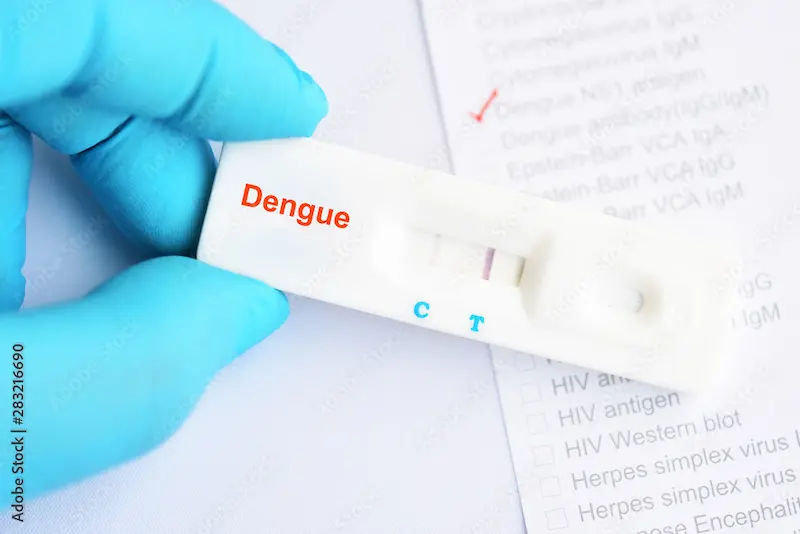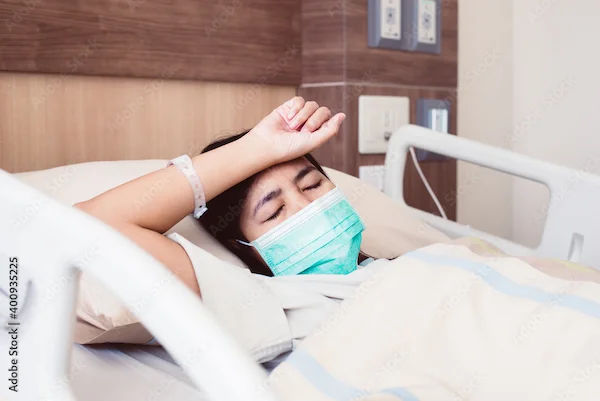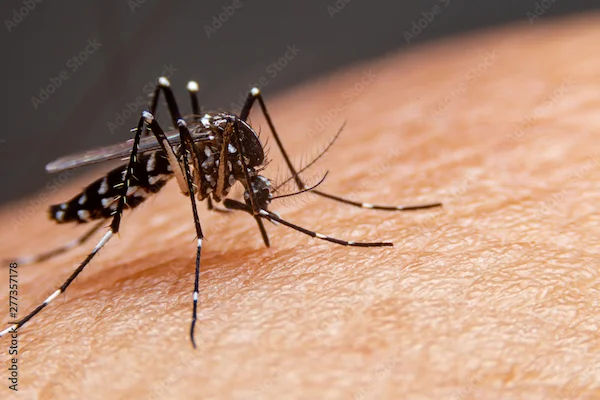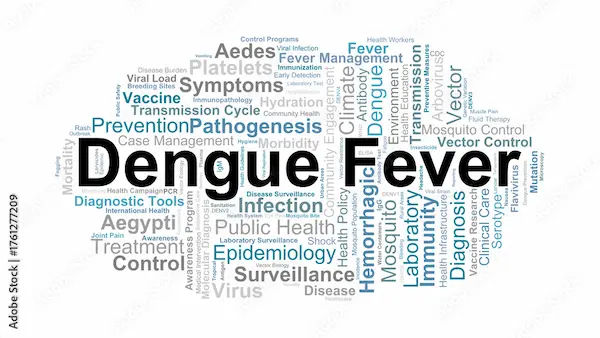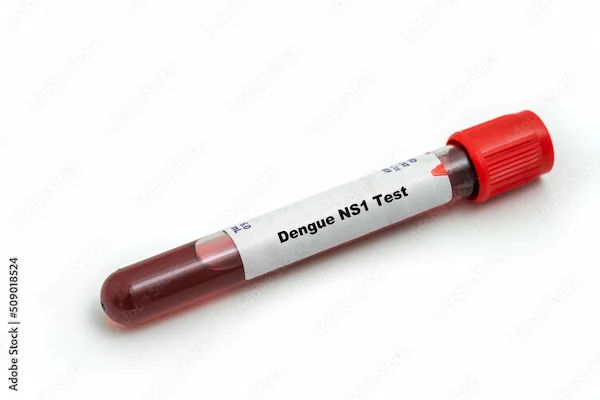Guide to Dengue Fever In Children
Explore a complete guide to dengue fever in children, including symptoms, causes, treatment, and prevention tips to protect kids from mosquito-borne infections.

Written by Dr. Rohinipriyanka Pondugula
Reviewed by Dr. J T Hema Pratima MBBS, Fellowship in Diabetes Mellitus
Last updated on 13th Jan, 2026

Discovering your child has a high fever is every parent's worry, especially during monsoon season when mosquito-borne illnesses are rampant. Dengue fever is a prevalent viral infection that can affect individuals of all ages, but it poses unique risks to children, who may find it harder to communicate their symptoms. This guide is designed to empower you, the parent, with clear, actionable knowledge. We will walk you through everything you need to know—from identifying the earliest symptoms of dengue in your child to providing effective home care, recognizing critical warning signs, and implementing robust prevention strategies. Our goal is to help you navigate this challenging situation with confidence and ensure your little one gets the best possible care.
What is Dengue Fever? Understanding the Virus
Dengue fever is a painful, debilitating viral illness caused by the dengue virus, which is transmitted to humans through the bite of an infected female Aedes aegypti mosquito. This particular mosquito is easily identifiable by the white bands on its legs and is a daytime biter, most active during early morning and late afternoon. There are four distinct serotypes of the dengue virus (DEN-1, DEN-2, DEN-3, and DEN-4). Recovery from infection by one provides lifelong immunity against that serotype but only partial and temporary immunity against the others. Subsequent infections by different serotypes increase the risk of developing severe dengue.
Consult a Top Specialist
How Do Children Get Dengue? The Transmission Cycle
The cycle begins when a mosquito bites a person already infected with the dengue virus. The virus then replicates inside the mosquito for 8-12 days. After this incubation period, the infected mosquito can transmit the virus to a healthy person (like your child) for the rest of its life through a bite. The virus enters the bloodstream and begins to multiply, leading to the onset of symptoms. It's crucial to understand that dengue is not directly contagious from one child to another; it requires the mosquito vector to spread.
Recognizing Dengue Symptoms in Your Child
The symptoms of dengue in children can range from very mild to severe. Younger children and those experiencing their first dengue infection often have milder symptoms than older children and adults.
Common Early Signs of Dengue in Kids
The symptoms typically appear 4-10 days after the mosquito bite and last for 2-7 days. Be on the lookout for:
Sudden High Fever: A fever of 104°F (40°C) is common.
Severe Headache: Often described as pain behind the eyes.
Body Aches: Severe muscle, bone, and joint pain, which is why it's sometimes called "breakbone fever."
Nausea and Vomiting: Loss of appetite is common.
Skin Rash: A reddish rash may appear over the body 2-5 days after the fever starts.
General Malaise: Your child may seem unusually tired, weak, and irritable.
Severe Dengue Warning Signs (Dengue Hemorrhagic Fever)
As the initial fever subsides, a small percentage of cases can progress to severe dengue, also known as dengue hemorrhagic fever or dengue shock syndrome. This is a medical emergency. Warning signs to watch for include:
Severe abdominal pain or tenderness
Persistent vomiting (often with blood)
Bleeding from the nose or gums
Vomiting blood or blood in stools
Rapid breathing
Fatigue, restlessness, or irritability
Pale, cold, or clammy skin
The Three Phases of Dengue Fever
Understanding the typical progression of dengue can help you anticipate your child's needs.
The Febrile Phase: Managing High Fever
This initial phase is characterized by the sudden high fever and the symptoms listed above. The focus here is on managing fever, ensuring hydration, and monitoring for any warning signs.
The Critical Phase: When to Be Most Vigilant
This phase occurs as the fever drops, usually 3-7 days after symptoms begin. This is the most dangerous period where plasma leakage can occur, leading to fluid accumulation, respiratory distress, and a rapid drop in platelet count. Close monitoring for the warning signs listed above is absolutely crucial during this time.
The Recovery Phase: Regaining Strength
If the critical phase is navigated successfully, the body begins to recover. Reabsorbed fluid leads to improved health, appetite returns, and energy levels slowly rise. A characteristic itchy rash may appear during this phase. It's important to continue ensuring adequate rest and hydration.
How is Dengue Diagnosed in Children?
If you suspect your child has dengue based on symptoms and potential exposure, a doctor will recommend specific tests.
Blood Tests for Dengue (NS1, IgM, IgG)
NS1 Antigen Test: This test can detect the presence of the dengue virus itself within the first 5 days of illness. It's a key tool for early diagnosis.
IgM Antibody Test: The body produces IgM antibodies a few days after infection. This test becomes positive after the 5th day of fever and can confirm a recent infection.
IgG Antibody Test: This test indicates a past infection. A combination of IgM and IgG results helps determine if it's a primary or secondary infection.
Monitoring Platelet Count
A complete blood count (CBC) is essential. A declining platelet count is a hallmark of dengue progression. While a low count is concerning, it's the trend (whether it's dropping rapidly) and the presence of other warning signs that doctors use to determine the need for hospitalization. Apollo24|7 offers a convenient home collection for tests like CBC and platelet count, allowing you to monitor your child's condition without the stress of a lab visit.
Get Your Health Assessed
Dengue Treatment and Home Care for Children
There is no specific antiviral medicine to treat dengue. Treatment is supportive and focuses on managing symptoms and preventing complications.
Keeping Your Child Hydrated
Dehydration from high fever and vomiting is the biggest risk. Encourage frequent sips of oral rehydration solution (ORS), water, coconut water, or clear soups. Monitor urine output; your child should be passing urine every 4-6 hours.
Managing Fever and Discomfort (What to Use and Avoid)
Use: Paracetamol (Acetaminophen) is the only recommended medication to reduce fever and relieve pain. Use it strictly as per the doctor's prescribed dosage.
AVOID: Do not give NSAIDs like Ibuprofen, Aspirin, or Diclofenac. These can increase the risk of bleeding and complications in dengue.
Dietary Tips for a Child with Dengue
Offer easy-to-digest, light meals. Focus on:
Fluids: ORS, coconut water, lemon water, barley water.
Protein: Dal (lentil) soup, khichdi, boiled eggs.
Fruits: Papaya (and its leaves, though evidence is mixed, it's a traditional remedy), pomegranate juice, kiwi.
Vegetables: Pumpkin, spinach, and beetroot can help support platelet production.
Preventing Dengue Fever: Protecting Your Child
Prevention is always better than cure, especially with no specific treatment available.
Mosquito Control: Repellents, Nets, and Clothing
Use child-safe mosquito repellents on exposed skin (as per age recommendations).
Dress your child in light-colored, long-sleeved shirts and full pants.
Use mosquito nets over beds, especially during daytime naps for infants.
Install screens on windows and doors.
Eliminating Mosquito Breeding Sites at Home
The Aedes mosquito breeds in clean, stagnant water. Regularly check and empty:
Water coolers
Flower pots and plant saucers
Discarded tires, containers, and coconut shells
Pet water bowls (change daily)
When to Rush to the Hospital: Emergency Warning Signs
Do not wait. Seek immediate medical attention if your child shows any of the following:
Severe abdominal pain or persistent vomiting.
Bleeding from any site (nose, gums, in vomit or stool).
Rapid breathing or difficulty breathing.
Extreme fatigue, restlessness, or confusion.
Cold, clammy skin or a pale appearance.
Not passing urine for over 6 hours.
If your child exhibits any of these severe dengue warning signs, consult a doctor online immediately with Apollo24|7 for urgent evaluation or proceed to the nearest emergency room.
Conclusion
Navigating your child's dengue fever can be a frightening experience, but being informed is your strongest tool. By recognizing the symptoms early, providing diligent supportive care with a focus on hydration, and knowing the critical warning signs that demand immediate medical attention, you can significantly impact your child's recovery journey. Remember, while most cases can be managed at home with careful monitoring, never hesitate to seek professional medical advice when in doubt. Staying vigilant about prevention by controlling mosquito populations around your home remains the most effective strategy to keep your family safe. Your awareness and proactive approach are the best defenses against this common yet serious illness.
Consult a Top Specialist
Consult a Top Specialist

Dr. Anand Ravi
General Physician
2 Years • MBBS
Bengaluru
PRESTIGE SHANTHINIKETAN - SOCIETY CLINIC, Bengaluru

Dr. Vivek D
General Physician
4 Years • MBBS
Bengaluru
PRESTIGE SHANTHINIKETAN - SOCIETY CLINIC, Bengaluru

Dr Syed Mateen Pasha
General Physician
2 Years • MBBS
Bengaluru
PRESTIGE SHANTHINIKETAN - SOCIETY CLINIC, Bengaluru

Dr. Harshendra Jaiswal
General Physician/ Internal Medicine Specialist
12 Years • MBBS , MD (General medicine)
Kolkata
108 DHANA DHANVANTARI Clinic, Kolkata
(25+ Patients)

Dr. Syed Ismail Ali
General Practitioner
7 Years • MBBS
Hyderabad
Apollo 24|7 Clinic, Hyderabad

